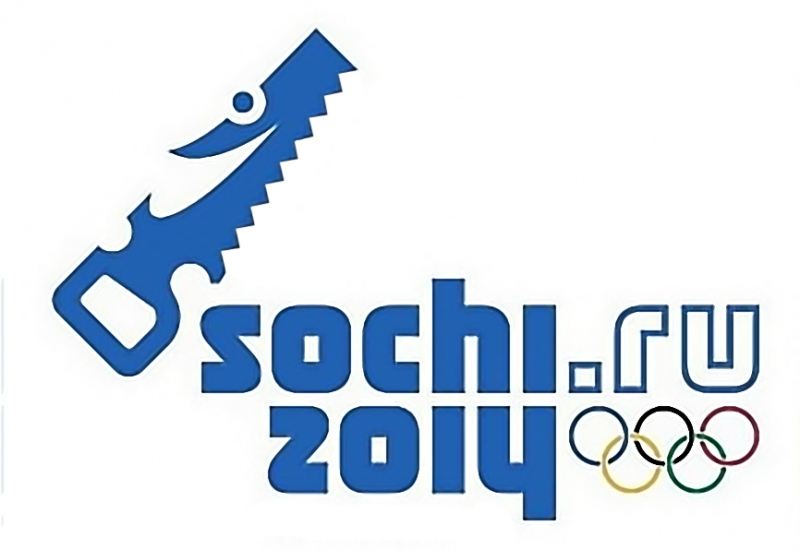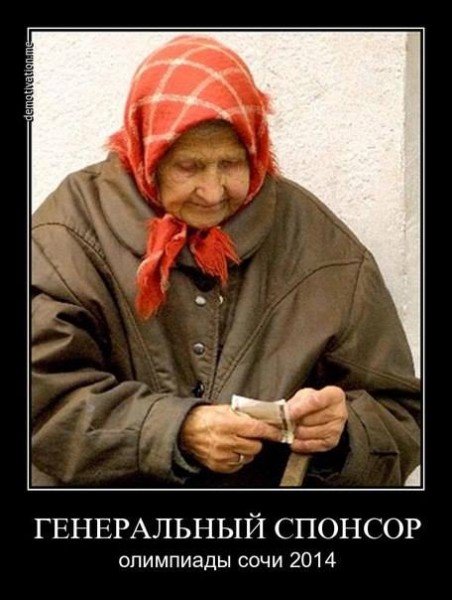
A photoshopped logo of the Sochi games with a saw mascot. In Russian, the verb “to saw” can mean “embezzlement.” Anonymous image distributed online.
Accusations of corruption continue to plague Sochi Olympic preparations. And with only two weeks to go before the opening ceremony, concerns are mounting. The stadium where the opening ceremony is set to take place is rumored to still be under construction, and journalists who are already there have complained about roads damaged by rain and mudslides. Additionally, Russia's Energy Minister Alexander Novak told President Vladimir Putin on January 9 that the power grid was still not operational (though he claimed that it would be completed by 25 January). Meanwhile, the International Skiing Federation president said that the high cost of the Olympics in Sochi (allegedly $55 billion) set a “bad example” for future host cities.
The Kremlin has been quick to defend its pet project. Deputy Prime Minister Dmitry Kozak, who is responsible for overseeing the preparations, stated that the International Olympic Committee had not had a single complaint about the preparatory work. He also claimed that the total cost of Sochi [ru] was less than the cost of last summer’s Universiade in Kazan, Tatarstan.
President Putin also decided to go on a charm offensive [ru], meeting with journalists from the Britain, the United States, Chinese, and Russian television for a group interview. During this interview American journalist George Stephanopoulos addressed the rumors of corruption. Putin cleverly deflected the question, first saying that the media had deliberately misinterpreted the statement by the ISF president accusing Russia, to sell more papers. Further, he opined that he had seen no evidence of corruption or embezzlement:
[…] если у кого-то есть конкретные данные о коррупционных проявлениях в связи с реализацией сочинского олимпийского проекта, мы просим предоставить нам эти объективные данные. Мы будем рады и благодарны и используем эту информацию для того, чтобы наводить порядок в этой сфере.
[…] if anybody has concrete evidence about corruption in connection with the implementation of the Sochi Olympic project, we ask for this objective data. We will be glad and thankful and will use the information in order to restore order in this sphere.
Opposition politician Boris Nemtsov, who had previously written a white paper [ru] on corruption in Sochi, and has alleged that more than half of the budget for the Olympics has been embezzled, shot back:
Надо помнить, что главным инвестором в Олимпиаду стали российские пенсионеры, учителя, врачи и военные. Именно они заплатили за всю эту аферу и фестиваль воровства.
We must remember that the main investors in the Olympics are Russian pensioners, teachers, doctors, and soldiers. They paid for all this fraud and the festival of theft.

A Russian pensioner — the “General sponsor of the 2014 Olympics.” Anonymous image distributed online.
Putin’s charm offensive may be too little, too late. Nemtsov’s Facebook post spread across [ru] Russia's own social network, VKontakte. An impromptu poll at the bottom of the page asked: “What is [Deputy PM] Kozak hoping for?” Nearly 80% answered that Kozak is hoping that people are brainless idiots.








3 comments